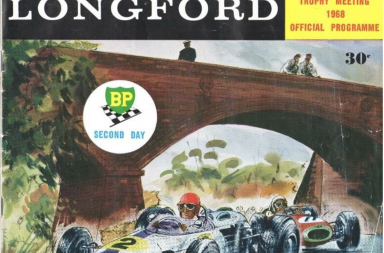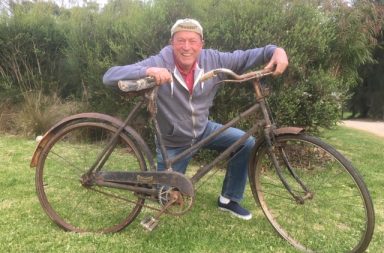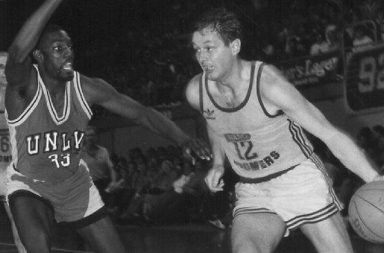IN my childhood, people knew a country town by its football team. You rated a town by its team – what League it was in, and what success it had. Now that national professional leagues have come to dominate the country, swamping local competitions with their all-encompassing brands, local sides have either disappeared or the leagues in which they play have become a shadow of what they were in bygone times. I think that is a tragedy. Tommy Hafey, the late Richmond premiership coach and Aussie Rules evangelist, often said a town that loses its football team loses its soul. My home town, Longford in Tasmania, hasn’t lost its football team yet. But the interest in the fortunes of Longford in the Northern Tasmanian Football Association is far, far less than the passion that existed when I was a boy. As I am guilty of living much of my life in the past, I hanker for the long ago days when the Longford tigers were the lifeblood of our little town. I still hit the internet every Monday to find out how the tigers fared the previous Saturday, though I suspect I’m the only one who does. I yearn for the day when the Tigers might again be the power they were in the year that I was born.
A month after my birth, in 1955, Longford won its first ever NTFA premiership. Although I was only a month old, I can tell you exactly how delirious our town went on the glorious night of our first premiership. I know this because the town’s elders have told me a thousand times. How our venerable coach, Fred Davies, stood on the bar of the Blenheim Inn, one of Longford’s three watering holes, and he led the chorus in rendition after rendition of ‘Old Shep’. I imagine how the whole town squeezed into that bar, and how everyone raised their glasses and sang their hearts out, exultant that our village had prevailed over the city clubs who had long dominated the Northern Tasmanian football competition. Twenty years later, when I went to Melbourne to work as a football reporter, I met Bruce Comben, the former Carlton captain, who one evening after training told me how he taught Fred Davies to sing ‘old Shep’. For Bruce, it was a throw-away story. For me, it was the genesis of a piece of revered history in our little town. Fred had been a Carlton great, vice-captain of the Blues’ 1947 VFL premiership team, a lumbering ruckman with great physical strength who became Longford’s messiah. There’s a poem…..
Some years ago to Longford town,
There came a man of high renown,
He came in answer to the call,
To teach our boys to play football….
So it went, the poem that was enshrined on the walls of the Longford football clubrooms. The story of how ‘Mulga Fred’ transformed a bunch of reckless young farm boys into the most powerful footy team in Tasmania, back when Tasmanian football was strong and proud and not afraid to mix it with the nation’s best.
Longford took premierships in 1955, 1957 and 1958, and won all but one game (the grand final) in 1956. In 1957 the Longford tigers were far and away the best team in Tasmania. The line-up was predominantly locals, including three farm boys from the little district of Bishopsbourne, boys who under the tutelage of ‘Mulga Fred’ became an unstoppable machine. Longford has been a town for more than 200 years, and yet most of the town’s elders would agree that the most significant person in Longford’s history was ‘Mulga Fred’. That’s a measure of the man’s status and also of how important winning football premierships meant to the people of Longford.
I grew up knowing the name of every man who played in Longford’s premiership teams. Whenever I’ve met any of them, and some I still see regularly, I always feel a little star-struck. In truth, I’ve always regretted not being born a few years earlier. How I would have loved to have been there to witness those premierships and to have found a little corner in the Blenheim Inn to listen to ‘Mulga Fred’ lead the masses in ‘Old Shep’.
Tragically, ‘Mulga Fred’ died of cancer in 1961. I was five years old and have no recollection of his passing. But in subsequent years I became vividly aware of how his family was torn apart and how the township of Longford never fully recovered. Fred Davies died leaving a widow Joan and two children, Helen, who was eight and Ian who was five. Ian and I were playmates. We shared a madness for kicking the footy, for running and for chasing, and every day after school we’d race from the schoolyard to the local footy ground, bouncing an old football, where we’d kick end-to-end until dark. The highlight on Tuesday and Thursday evenings would come about 4.45pm, when the first of the Longford football team players would arrive for training, and they would kick with us boys, as we’d fling ourselves into the air against each other, trying to take overhead marks.
We played endlessly. Our mothers didn’t worry about our welfare because they knew where we were. Each training night we’d get home to our respective hours at about 7pm, usually filthy dirty with parts of our clothing ripped or worn. Ian’s mother was raising two young children on her own. My mother was also on her own, because my father went away shearing on the mainland from April until October every year. In rural Greece there’s a saying that the village raises the child. In the case of Ian and I, and most of our little mates, we were raised by the players of the Longford football club. Courtesy of those footballers, we learnt to swear like troopers.
We threw magic words around with the worst of them. This got us into trouble at school, but our mothers were just glad that we came home of an evening happy, tired and hungry. If the players had a pie night, there was always a pie for us.
The football ground was our playground. Part of the recreation reserve was a plantation of pine trees, mixed with gorse that grew wild, a setting which made for great games of hide n’ seek or for scramble races on our bikes. We often climbed up into the ceiling of the wooden shed that became a shop of match-days, pelting each other with the bottle tops from cordial bottles that were served. One day Ian fell out of the bearers and landed hard on the wooden floor. After the initial thud, he made no sound. For a few seconds I thought the worst. Then he burst forth with one gasp after another, desperately trying to get oxygen into his lungs, as his face turned bright red and his eyes filled with tears. I reckon he cried for a minute and then the tears ebbed away to be replaced by laughter.
As frightened and as sore as he was, Ian used that experience to launch our careers as human cannonballs. When my mum wasn’t home, we’d grab a couple of bed sheets from our linen cupboard, tie a sheet around ourselves, and then jump off the roof of our outside toilet. We’d pretend we were Superman. Time after time, with our friends ‘Blacky’, ‘Acky’ and Schneider, we launched ourselves into the air, landing on the back yard lawn. The jump was probably only two or three meters, and each would try to outdo the other by jumping out further from the building. The Superman jumps went on for months, until Ian put his foot through the roof of the outdoor toilet and mum really cracked it.
Ian’s mum never got over her husband’s death in early 1961. When Ian was eight, his mum took him and his sister to America to be live near the mum’s sister in a place called Galesburg, Illinois. There lies another a story I’ll tell you one day.
As for Longford football club, the team somehow recovered in 1961 to reach the grand final, playing against hated arch rival North Launceston.
With a few seconds to go in that grand final, Longford was one point in front and the ball was kicked into the air in North Launceston’s half-forward line. Fortunately, the safe hands of our beloved captain Ivan ‘Ike’ Hayes were safely waiting and he dragged down what seemed to be the math-saving mark. However, the North Launceston captain-coach, Bob ‘Porky’ Withers, leapt into ‘Ike’s back, plucked the ball out of his hands, and claimed the mark. To the astonishment of every Longford supporter among the 13,000 spectators, the umpire awarded the mark to Withers. The Longford fans’ displeasure was eased by the fact that Withers was so far out from goal that he could not possible kick the ball far enough to change the result of the game. Withers was a short, squat man, with arms and legs like tree trunks and a pugnacious face so ugly that it would frighten a Tasmanian devil. To the amazement of everyone in the ground, he launched the ball into the air and it sailed through the posts, giving North Launceston the most remarkable victory by five miserly points.
More than a half century later, Longford people have not recovered from that result. At school, I learnt my first rhyming verse:
Roses are red, violets are blue
Bob Withers stinks, and so do you.
Two years later, ‘Ike’ Hayes and Longford would face Bob Withers and North Launceston in another NTFA grand final.
On the day before the big match, I was kicking an old footy on the Longford ground when a photographer from the Launceston Examiner arrived, accompanied by Withers’ five year-old son Stephen.
The photographer brought with him a kid-sized Longford jumper and asked me to put it on and pose alongside Stephen Withers for a picture.
The resultant photo appeared on page 1 of The Examiner on grand final morning with the explanation that we would be the mascots for the opposing clubs.
Though I never missed a Longford match and knew the players better than most of my classmates, I had never actually been a mascot. But there it was in the newspaper – I was a mascot. So, I had to be the mascot for that day. Early on the Saturday morning mum and I rustled up some mascot gear and we set off in mum’s FJ Holden on the 15km trip to the city of Launceston (population 40,000). Mum wasn’t fairly intimidated by city traffic, so much so that we parked the FJ in the outer suburb of Kings Meadows and caught a bus for the rest of the expedition to the city. From there, we walked to the York Park footy ground.
Fortunately, we had given ourselves plenty of time for this epic journey, arriving at the ground fully four hours before the match was due to start.
Anticipating a monster crowd (12,000 wasn’t unusual at a footy final in Launceston in those days), we parked ourselves in the old timber stand, where we ate our packed lunch and anticipated the moment when – as Longford mascot – I would lead the Longford tigers onto the field.
Eventually it came to 1.30pm, a half hour before the big game, and mum sent me down through the crowd to wait outside the Longford rooms, ready to lead them through the gates onto the arena. I came to the door of the change rooms, which was closed, but I could hear the players inside urging each other, while they ran on the spot, stomping their stops into the timber floors. I stood outside the rooms, breathlessly waiting for the moment when the door would swing open and I would lead the way to the big match. I waited and waited…..till, finally, an official swung open the door. And there, I was met by the horrifying sight of Bob Withers.
Stunned and frightened, I stood aside to let him and his team pass.
By the time I recovered, the Longford team had emerged from its dressing room a hundred meters away and was already running onto the field.
I was shattered.
So embarrassed that I took 10 minutes to weave through the crowd back up to where mum was waiting, wondering what had happened to my one glorious moments as the Longford mascot.
I couldn’t speak. I couldn’t imagine that the day could get any worse.
But it did.
Longford led for most of the day, but in the last dramatic seconds, North Launceston scored the match-winning goal and – for the second time in three years – the premiership was stolen from our clutches.
Mum and I cried. And so did Longford people around us.
An old friend consoled us that we were so close to winning a premiership that we should worry. He said it was inevitable that we would win the title the following year, or maybe the one after that.
More than a half century later, we still haven’t won another NTFA premiership.
We’ve had many chances, played in several grand finals, produced players who were good enough to be chosen as all-Australian, yet we’ve never won another NTFA flag.
As we sat on the bus taking us back to where the FJ Holden was parked, mum told me that I shouldn’t expect too much, and then I wouldn’t be disappointed. It was the same advice she gave me so many times in my childhood. After all these years, I don’t expect much of Longford footy club, and I accept that another Fred Davies is ever going to walk into the Longford rooms and build a footy team that becomes the envy of all Tasmania. But I can dream…..



